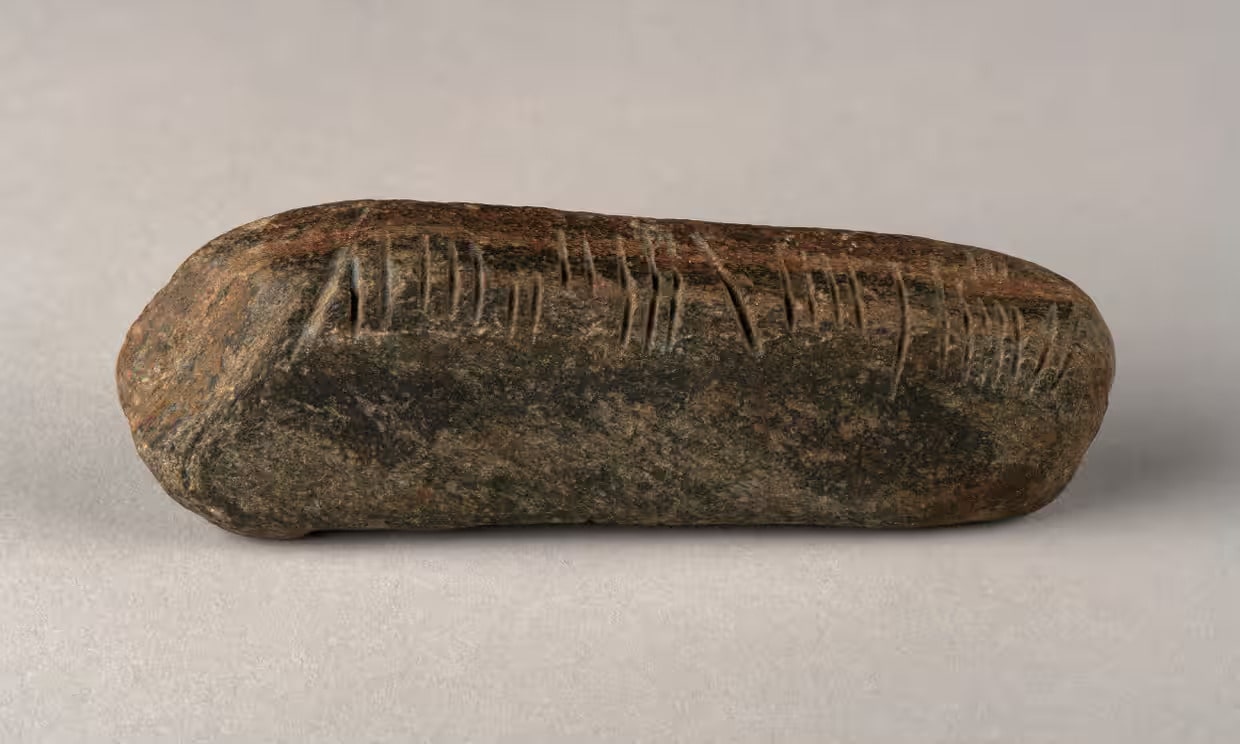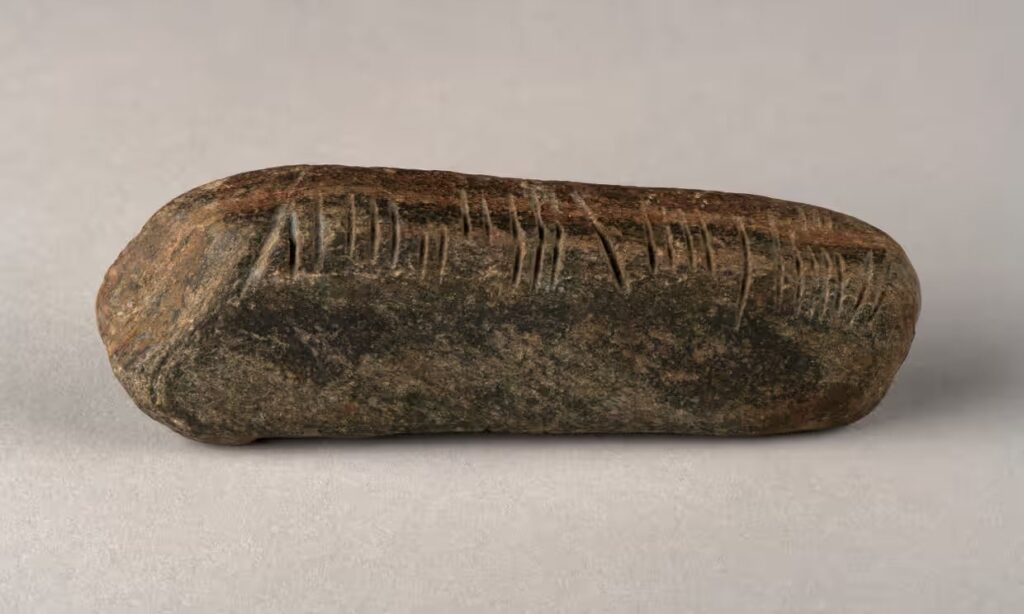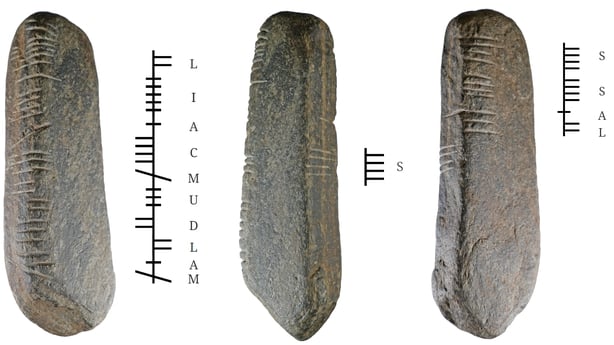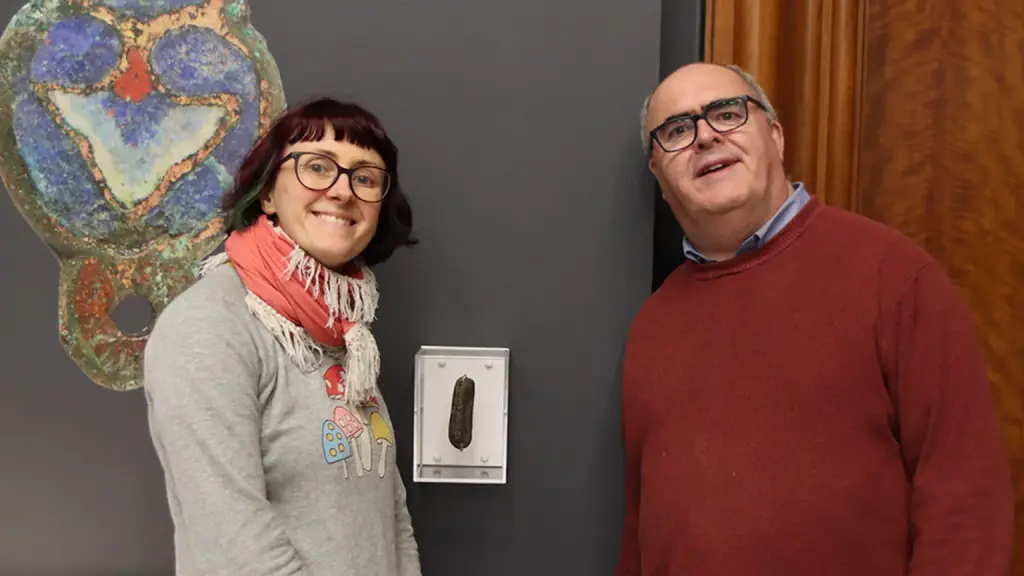Stone with 1,600-year-old Irish inscription found in English garden

Stone with 1,600-year-old Irish inscription found in English garden
A geography teacher, Graham Senior, stumbled across a rock with mysterious incisions while tidying his overgrown garden in Coventry, England.
The discovery of a small stone carved with an early form of Celtic script has caused excitement among archaeologists.

The rectangular sandstone rock was found by Graham Senior in Coventry during lockdown in 2020 while he was weeding, but its true value was only recently understood.
The 11-centimeter-long and 139-gram rectangular sandstone rock had cryptic inscriptions on it that suggested a history spanning over 1,600 years, all written in the mysterious Ogham alphabet.
Ogham is an early medieval alphabet used to write the Archaic Irish language from the 4th to the 6th century and Old Irish from the 6th to the 9th century. It is usually found carved on stones in Ireland, Wales, and western Britain. It was the first written language in Ireland. The majority of the 400 or so known inscriptions from the Archaic Irish period are family name pillars that were built to announce land ownership.
Ogham is an extremely unique writing system among all writing systems, with lines arranged in groups of one to five only. The stones provide insight into the Irish language before the use of the Latin insular script.
Finds liaison officer for the Birmingham Museums Trust, Teresa Gilmore, told RTÉ’s Morning Ireland that the discovery on an Ogham stone in the English midlands was a rare find.
“These finds do not turn up in the midlands. The bulk of Ogham inscriptions are found over in Ireland,” she said.

 Graham Senior with Ali Wells, exhibition curator at the Herbert Art Gallery and Museum in Coventry.
Graham Senior with Ali Wells, exhibition curator at the Herbert Art Gallery and Museum in Coventry.
Professor Katherine Forsyth of Celtic Studies at the University of Glasgow conducted additional research that shed more light on the stone’s provenance. Her findings point to a period suggesting a timeframe ranging from the fifth to sixth centuries, with the possibility of an even earlier date in the fourth century.
The stone is inscribed on three of its four sides. The inscription on the stone, “Maldumcail/S/ Lass,” puzzled researchers, with interpretations pointing towards a version of the personal name Mael Dumcail, but the meaning of the S and LASS is unclear. Given the usual purpose and significance of ogham stones, it may be a location reference.
Theories regarding the origins of the stone abound, with speculations ranging from migration patterns to the presence of early medieval monasteries in the region.
The rock will be displayed at the Herbert Art Gallery and Museum in Coventry, to which Senior has donated it permanently. It will feature in the forthcoming Collecting Coventry exhibition, which opens on 11 May.
News
The Hanging Temple: China’s 1,500-Year-Old Cliffside Marvel of Faith and Engineering
The Hanging Temple: China’s 1,500-Year-Old Cliffside Marvel of Faith and Engineering Perched precariously on the cliffs of Mount Heng in Shanxi Province, China, the Hanging Temple, also known as Xuankong Temple, Hengshan Hanging Temple, or Hanging Monastery, is an architectural…
The Willendorf Venus: A 30,000-Year-Old Masterpiece Reveals Astonishing Secrets
The Willendorf Venus: A 30,000-Year-Old Masterpiece Reveals Astonishing Secrets The “Willendorf Venus” stands as one of the most revered archaeological treasures from the Upper Paleolithic era. Discovered in 1908 by scientist Johann Veran near Willendorf, Austria, this small yet profound…
Unveiling the Maya: Hallucinogens and Rituals Beneath the Yucatán Ball Courts
Unveiling the Maya: Hallucinogens and Rituals Beneath the Yucatán Ball Courts New archaeological research has uncovered intriguing insights into the ritual practices of the ancient Maya civilization. The focus of this study is a ceremonial offering found beneath the sediment…
Uncovering the Oldest Agricultural Machine: The Threshing Sledge’s Neolithic Origins
Uncovering the Oldest Agricultural Machine: The Threshing Sledge’s Neolithic Origins The history of agricultural innovation is a fascinating journey that spans thousands of years, and one of the earliest known agricultural machines is the threshing sledge. Recently, a groundbreaking study…
Nara’s Ancient Sword: A 1,600-Year-Old Protector Against Evil Spirits
Nara’s Ancient Sword: A 1,600-Year-Old Protector Against Evil Spirits In a remarkable discovery that has captured the attention of archaeologists and historians alike, a 7.5-foot-long iron sword was unearthed from a 1,600-year-old burial mound in Nara, Japan. This oversized weapon,…
The Inflatable Plane, Dropped Behind the Lines for Downed Pilots
Experimental The Inflatable Plane, Dropped Behind the Lines for Downed Pilots The Inflatoplane from Goodyear was an unconventional aircraft developed by the Goodyear Aircraft Company, a branch of the renowned Goodyear Tire and Rubber Company, also famed for the Goodyear…
End of content
No more pages to load











